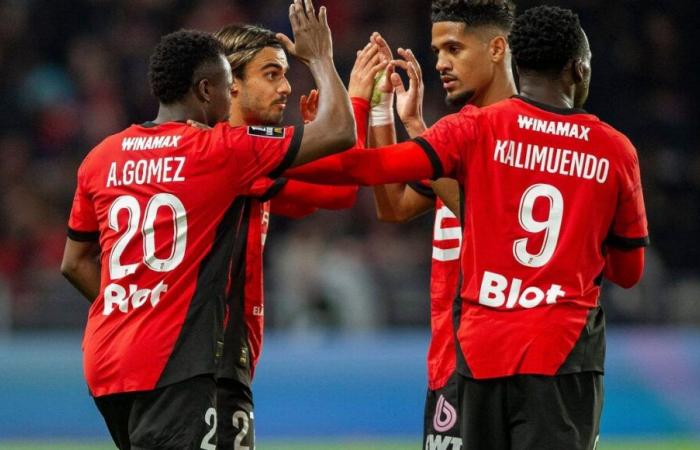By winning against Le Havre last week, Stade Rennais was not completely reassured. Success on the smallest of margins did not satisfy the Rennes public, who showed their discontent with whistles at the final whistle. More than a criticism of the players' investment, this mark of discontent appears rather linked to the dissatisfaction of observing week after week a game that is quite poor in spectacle on the offensive level. A recurring problem since the start of the season for Julien Stéphan and his men.
A notion of spectacle that is sometimes difficult to integrate into the search for performance, but the Rennes coach says he hears this expectation from the public: “I understand that you have to win straight away, that you have to play well straight away, that you have to create a lot of chances right away. It's the theory, and then there's the practice, and in practice it's more difficult to put in place when there have been so many changes and when we have had to delay the integration of certain offensive players. The idea is not to look for excuses but to find explanations. But everything else I understand, and for the public to expect that, ultimately I find it normal.“
Tactical trial and error, limited choices and lack of technical accuracy
After starting in a 4-4-2 diamond, attempting a flat 4-4-2 in Reims, installing a 3-4-3 which did not resist the insufficient performance of the pistons, Julien Stéphan now wants to rely on the 4-3-3 used against Le Havre: “This is the path that we intend to follow, this is the path that we had in mind from the start and which could not be used for reasons that I have mentioned many times“. At the forefront of which are long limited choices in front due to the absences and the slow physical start of the two wingers Jota and Andrés Gómez. The Colombian is uncertain for the trip to Auxerre after suffering a shock in training this week.
These system changes did not facilitate the implementation of automatisms on the offensive level for a group of players completely modified in the offseason. Taking into account playing time over the 2023/2024 season, Rennes is the Ligue 1 team which has experienced the most upheavals in its squad this summer. But that cannot excuse everything and progress appears minimal game after game in creating danger on the Rennes side.
Conversely, with regard to the ability to control the opponent, the statistics are promising for the Rouge et Noir, who are among the teams in Ligue 1 that recover and keep the ball the highest in the opposing camp. It is therefore in the last third of the field that Rennais are struggling and where they absolutely must progress according to Julien Stéphan: “It is certain that we have to improve in the last thirty meters to create more danger, we work a lot as a result of that too, we do situational training, we develop a lot of things there above, I hope that we will be able to see positive signals quickly. (…) Knowledge of each other must develop gradually. There is also lucidity and technical accuracy to validate existing situations, there have been a certain number of them since the start of the season and which must lead to more qualitative actions in terms of creating danger.“
Another statistic illustrates this observation: with an average of 0.08 xG* per shot attempted, Rennes is one of the teams creating the worst striking positions in the league this season (only Brest and Saint-Etienne do worse). Proof that the team struggles to unbalance its opponents through shifts, and to put its attackers in favorable situations. As underlined by Julien Stéphan, the Rouge et Noir must also demonstrate more technical accuracy, a sector in which they have displayed in sequences during certain matches a level sometimes unworthy of Ligue 1. The Rennes have so far displayed a rate of successful passes well below natural candidates for Europewhich can certainly be put into perspective by their higher than average possession, and therefore smaller spaces for their transmissions, but which also questions the level and individual performances of the players.
Creative freedom or elaborate combinations?
In this context, what is the staff's philosophy on building their offensive game in the opposing final meters? Some coaches favor creative freedomleaving their talents responsible for finding solutions to unbalance defenses, where others choose to tactically frame these sequences through repeated combinations in training. As it stands, Julien Stéphan places himself more in the second camp: “At the time we are in, I believe in setting up combinations, because we have a young group with very little common experience. To strengthen the benchmarks, I initially believe more in the creation of combinations and strong collective benchmarks in these situations. And secondly, when we have passed this phase, when we are still far from having succeeded, we can allow a little more freedom based on already existing benchmarks and common knowledge.“
So far this work has not borne fruit, with Rennes' most successful offensive performance dating back to the first day against Lyon. But by assuming this philosophical choice, after recalling the context of the offseason, the Rennes coach places himself, with his staff, also responsible for the disappointing offensive performance at the start of the Rennes season. After more than a quarter of the championship disputed, in an insufficient but not crippling accounting situation, Stade Rennais must quickly show its progress in the game, preferably this Sunday against Auxerre.
*xG = Expected Goal. The xG model measures the dangerousness of a strike, using historical data from thousands of similar shots to estimate the probability of a goal on a scale of 0 to 1.






